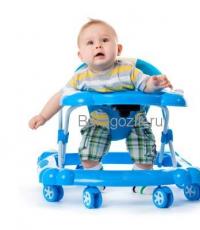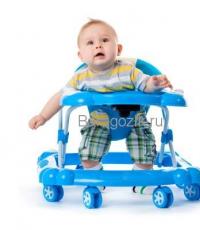If the child abruptly began to blunt what to do. Slow Child: Causes and Tips for Parents of Slow Children
Today, there are a lot of various methodological developments aimed at helping parents in raising children. However, many of these methods contradict each other. After all, some teachers believe that children need to be pampered, others should be kept in strictness. Still others - recommend giving children complete freedom, fourth - to educate by example. However, all teachers, practitioners and theorists are unanimous in their opinion that the most important thing in raising children is love! From the very first days, the child must be surrounded by attention and care. Parents should clearly understand a simple truth - it is not our salary that makes children happy. First of all, they need parental care and love.
In the article we will talk about which household items and toys are initially useful and necessary for the baby, and over time can cause quite serious damage to his development.
Nipple after a year
The sucking reflex in a baby is closely related not only to receiving food, but also to a sense of security. Putting the baby to the breast, mommy gives him some of her warmth, the baby feels her care and love. Baby is comfortable and relaxed. It is not surprising that in the future he will try with all his might to prolong this feeling. Therefore, it can be very difficult to wean him from a pacifier or pacifier.
What are the consequences of a prolonged "sucking" reflex? Of course, to the habit. A grown baby will suck water from a bottle all night, or not remove a finger from his mouth. At primary school age, the child will begin to suck or gnaw on the end of a pencil or pen. At an older age, it is possible that a cigarette will replace the nipple.
Often, loyalty to this habit leads to a damaged bite and crooked teeth, to frequent stomatitis, to psychological dependence. According to psychologists, the incentive for the further development of children is their exit from the comfort zone. Therefore, after a year, parents should make every effort to ensure that their child parted with his usual nipple.
Diapers after 1.5 years
We will not urge modern parents to abandon diapers in favor of the usual gauze diapers that our grandmothers used. But we will not support mothers whose children continue to wear diapers at the age of three. The discomfort that babies experience in wet pants will encourage them to further development. They will try to control their behavior and are more likely to be potty trained.
As soon as the baby is one and a half years old, parents should pay close attention to this behavioral aspect. Of course, diapers for modern mothers are salvation, but they should not forget that at the age of one and a half, the crumbs begin to form conscious control over the excretory function. As soon as the baby begins to use the potty, he will learn to regulate all his behavior in general.
Curved spoons and walkers at any age
Loving parents try to make life easier for their child to the maximum. Cunning manufacturers, taking this desire into service, immediately released curved spoons for children.
Undoubtedly, curved spoons will reduce the amount of porridge on the floor, save the amount of soap that parents will need to wash their baby's dirty face, but .... They will in no way contribute to the development of spatial representations in the child and will not allow him to formulate a picture of the world around him in a timely manner.
The same situation will be observed with walkers. Of course, constantly using a walker, your baby will forget about the falls, but he will not feel the terrain surrounding him. As a result, he will lag behind his peers in development, and for him the world around him will still remain a mystery.

Talking interactive toys after 2 years
In this section, we will talk about toys that pronounce whole phrases, answer questions. With these toys “stuffed” with electronics, the child tries to communicate, conduct dialogues, carefully listening to their answers.
According to psychologists, prolonged contact with such toys is harmful to the child. After all, he mechanically begins to repeat the same phrases, not focusing on the very context of the situation. A rather limited set of phrases does not contribute to the development of the game. Of course, interactive toys are quite funny, but they are not suitable for friends. The child's friends should be his peers.
TV at any age
Undoubtedly, television is one of the outstanding achievements of mankind. However, according to most scientists, prolonged and uncontrolled viewing of television programs has a negative impact not only on the health of children, but also on their development. Children very quickly get used to the TV, very small crumbs urgently require their parents to turn on the “magic box”. And not always they watch only cartoons. In most families, children manage to watch all the programs in a row - news, adult films, sports programs, music shows and endless commercials. All this information in the mind of the child is mixed up in a heap and, of course, ceases to be any useful.

Doctors warn :
- Babies and TV are incompatible concepts.
- Children from one year to three years old can watch TV for no more than half an hour a day. When watching cartoons, one of the adults must be next to the baby. And not just to be, but to follow the developing events together with the child, to explain, supplement and make the necessary clarifications.
- At 5-8 years old, parents should also strictly limit the time they watch TV shows. The programs that children will watch at this age should be educational.
- Long-term television viewing has a negative psychological impact on the child. The child may become nervous, short-tempered and unbalanced.
- Parents should not use the TV as background sound either. Children quickly get used to it and absolute silence frightens them.
Sweets without limits
Loving parents want their children to have nothing to lack. There is a huge vase of sweets on the table, cakes in the fridge - all this is wonderful! However, then parents should not be surprised why their children eat nothing but sweets. Juices, sweets, cookies, cakes before meals completely fill the volume of the child's ventricle, provoking refusal to eat. By the way, parents should not forget about the condition of the teeth of little sweeties.
Electronic games without limits
Computer and electronic games have already firmly entered our lives. Of course, no one will dispute the fact that many games carry a lot of useful information and have a beneficial effect on the development of children. However, everything is good in moderation.
The main danger posed by electronic technologies is the emergence of gambling addiction in children. Many teenagers, having fallen into such an addiction, cease to be interested in real life and go into the virtual world with a “head”.
Of course, parents should not completely prohibit electronic games, but they must limit the time spent at the monitor. Indeed, many children become real gamers, they lose their appetite, they abandon their studies, they do not sleep well. Children, unlike adults, do not know the measure. In some particularly difficult cases, parents are forced to seek help from psychologists.
Monster toys at any age
Children's fantasy is repelled by the surrounding reality. However, during the game, she is able to transform.

Monster dolls: what is the harm to the child?
Child psychologists continue to have endless debates on the topic - should children buy monster toys? Some are sure that such toys are not capable of causing any harm to the child's psyche. Brave heroes during the game will surely defeat the monster. After all, in any fairy tale there are bad characters. However, other experts do not agree with this opinion. They are sure that ugly dolls and transformers with evil faces should not be present in the children's playroom. Some parents believe that freak dolls help children cope with fears. However, most psychologists believe that only a loving mother can help cope with children's fears. And monster dolls can only cause additional trauma to the child's psyche.
Tricycle scooters after 3 years
If your three-year-old has mastered cycling, great! However, riding this type of children's transport involves only the lower half of the body. Back, abs, arms rest. Another thing is a scooter. When riding it, all parts of the child's body are included in the process. The child develops faster and more actively. When choosing between a two-wheeled and three-wheeled scooter, pediatricians recommend focusing on the first one. After all, the fewer wheels a scooter has, the faster a child will develop a sense of balance.
Free pocket money at any age
Psychologists believe that financial education should be carried out by parents from an early age. Only in this case, the child will learn to spend money rationally, and will know their “price”. The times when our parents told us that happiness is not in money are behind us.

Why should kids have pocket money?
- Money helps to develop a sense of responsibility in children.
- They develop their independence.
- Learn to make decisions.
- The presence of money significantly increases self-esteem, and gives the child confidence.
However, giving pocket money to a child should not become a habit. After all, if at first the child is happy, having received a small amount, then in the future his requests may grow. He may begin to take money for granted, and even demand it from his parents. The issuance of money should not develop into a consumer attitude towards parents. Even adults can't always survive the ordeal with easy money. As for the children, everything will depend on the correct behavior of the parents.
How much money to give a child? The question is purely rhetorical, because in this case everything will depend on the needs of the child and the financial capabilities of the parents. However, adults should remember that easy money corrupts children, makes them dumber and greedier. Children must understand that their parents' money does not fall from the sky.
Quite often, losers are far from stupid children. A smart girl and a quick-witted boy now and then bring bad grades. Let's try to figure out the reasons why a child does not study well. Consider all options. Poor academic performance from the very beginning of school life, or in high school.
Heightened self-esteem. Most often, when a child is used to easily getting everything he wants, it is difficult for him to understand and accept the need to work on his own in order to get a result.
At home, he is praised and admired by the very fact of his existence. There will be no such relationship in the school. The child gets into a pose and refuses to learn.
Solution: you need to stop showering your child with gifts, and praise him only in words. The child must understand that parents are senior leaders and educators, and not an eternal source of material wealth.
Ratings only. When parents are only interested in the numbers in the diary and in notebooks, and not the inner world of the heir. In daily running around, we often simply do not have time or do not want (there is no strength left) to hug the baby and ask about friends, mood or failures. Only marks, marks, marks.
Good grades - mom pats on the head and runs to the kitchen. Dad might not talk about school at all. But in vain. After all, the whole life of children passes among peers and teachers. And not always joyfully and without conflicts. So the child begins to try with bad grades to draw the attention of relatives to internal experiences and, perhaps, problems.
Solution: start spending more time. Walk together, play board games and read. Go to the park, to the skating rink, to the cinema. Talk, but do not use the words "grades", "school". Share your memories of childhood and friends - girlfriends. Tell us what games you played and what films you watched, how you resolved conflicts. The child will be drawn into the conversation and feel that you are concerned not only with the fact that he does not study well, but also with his state of mind.
Excessive exactingness. If parents expect more from their children than what he is capable of, and make excessive demands, the child begins to be afraid to make decisions on his own, fearing criticism and anger from elders. Such children prefer to remain silent in the classroom and not participate in the educational process.
Decision. If you notice this behavior in your child, change the way you communicate with him. In order for the student to believe in himself, praise him for his diligence, diligence in completing the lessons, for the initiative. Let the child understand that independence is cool and pleasant. Make a daily routine and help organize free time. Sports sections are very good at educating discipline and independence. Enroll your child as he wishes, support him in his efforts and praise him for his successes.
The student is not interested in learning. Children are pragmatists and do not understand why accumulate knowledge that is not yet known, whether it will ever have to be applied.
Try to find something for your student to enjoy, where he can see science in action. Go around all the clubs that are in the school or the nearest children's club. Young chemist, cook, designer, physicist. Circle of modeling, knitting, programming. Useful knowledge of mathematics, physics and other skills gained in the classroom.
No rivalry. A child does not learn well if he does not have an incentive. When a child-leader sees that his efforts and high performance are poorly encouraged by teachers and not appreciated enough by classmates, he loses all desire to learn.
Output. Involve the ambitious student in extracurricular activities. Let him show leadership qualities in the role of headman. Ask the teacher to give the child responsible assignments, to involve them in competitions and olympiads.
If you cannot agree with the class teacher, transfer the child to a class or school with stronger students, where he will be able to communicate with peers on an equal footing.
Excessive study loads. When parents set a too tight schedule of classes and sections for children, he gets tired. And in middle school and high school, when parental authority declines, a child can rebel and drop out of school.
To remedy the situation, it will be necessary to reduce the load on additional extracurricular activities. Listen to the heir. Transitional age and health problems can permanently or permanently unsettle a teenager. let him on weekends or even sometimes skip Saturday classes to be with you. Praise more for efforts in the subject that the child likes. Gradually, he will develop a desire to receive praise in other subjects as well.
Why do smart kids fail at school? I think you got the main answers to your questions. And none of our children are brakes. If something is not going well with our heirs with their studies, then it is only in our power to help them cope with the difficulties.
Remember yourself more often at school age and love children unconditionally. Childhood will fly by quickly, make it happy.
“Come on quickly, otherwise we will be late for kindergarten again!”- Mom begs, and the baby continues to hesitate. This problem is familiar to many adults. Someone forces children to finish breakfast or dressing, urging them on with offensive words and even slaps on the back of the head. Others remake everything themselves, leaving the mess alone. How to help a slow child and an irritated mom?
To choose the right approach to the solution, it is necessary to understand the reasons for this slowness. And they are not always on the surface. The problem is most often noticed by parents in preschool childhood, although the first signs can be tracked already in infancy.
Such a feature can cause a lag in learning and the formation of skills, low concentration of attention and absent-mindedness, a feeling of guilt due to regular remarks and, as a result, neurosis. Therefore, the identification of the source of sluggishness should be entrusted to a neurologist, psychologist or pediatrician.
Where does slowness come from?
- Sometimes this happens on the background of a long illness. After the restoration and increase of immunity, the pace of the child's activity is restored.
- It can occur due to an organic pathology of the brain resulting from an unfavorable pregnancy, a difficult birth, or the birth of a premature baby.
- Often, excessive "retardation" is just a period of normal development. In the early years (from 1.5 to 3 years), children are characterized by imperfection of fine motor skills. Their fingers can not cope with fastening buttons, tying shoelaces.
- The retraining of left-handers to right-handers is also on the list of factors contributing to the slowing down of mental processes.
- The phlegmatic is a classic example of a goofball. He does not tolerate haste, reasonable and thorough. He does not like innovations, he chooses proven and familiar methods. Wake-up and preparations become a real test for adults.
- A decrease in overall activity is often associated with a stressful situation - moving, divorce, transfer to a new educational institution, domestic conflicts. Children's psyche simply can not cope with the increased load.
- Slowness is another form of manipulation of adults in a family with an authoritarian type of upbringing, strict requirements, severe punishments and continuous control. In this way, the child secretly protests against numerous assignments and orders.
So, in some cases, to change the situation for the better, it is enough to improve relations between households, wait until he grows up, or take vitamin therapy to promote a speedy recovery. Now let's discuss what to do if the baby is unhurried by nature, and this is in no way related to family upbringing.
Moms take note!
Hello girls) I didn’t think that the problem of stretch marks would affect me, but I’ll write about it))) But I have nowhere to go, so I’m writing here: How did I get rid of stretch marks after childbirth? I will be very glad if my method helps you too ...
What do we have to do?
- Get an hourglass that visually demonstrates how time flies. Invite the child to dress or eat until the sand runs out. With the help of such a device, he will independently learn to monitor the speed of his actions and will try to finish all things as quickly as possible.
- Sometimes a son or daughter falls into a stupor due to the difficulty in switching to another activity. Give them some time to prepare: "Play with the construction set for another five minutes, and then we'll have dinner and brush our teeth." The warning will prepare them for the next task.
- Most children feel calmer if they have a clear daily routine. For preschoolers who can't read yet, it's helpful to have a graph with photos that shows the sequence of actions: washing, dressing, eating breakfast, etc. This way you can significantly reduce the number of reminders, and the child will feel more confident.
- Develop the mobility of the nervous system through daily work. It can be running, finger gymnastics, cycling, jump rope exercises. To heighten the effect, switch from a slow rhythm of classes to a fast one.
- Pay special attention to the adaptation stages in educational institutions, because such children are inherently afraid of the unknown. Be sure to tell the teachers about the psychological qualities of the future pupil.
- Planning is one of the best ways to deal with your baby's sluggishness and anger. If a schoolboy seems to take half a day to wash in the morning, prepare his clothes in the evening and make sure that his backpack is packed and waiting for the owner at the door. Reduce chaos and your emotional state will also return to normal.
- Set clear time limits for your student to engage in certain activities. For example: "Dima, you have 20 minutes to have lunch." After 15 minutes, discreetly remind that the meal will soon be over.
- If a child is having difficulty going to school, not having time to learn the educational material, you should help him at home. Analyze and repeat everything that he goes through in the lessons. Better yet, go ahead a few topics to keep up with the teacher's thoughts.
- Constantly provide unobtrusive support to slow children, showing genuine interest. They are very often unsure of their own skills and abilities, and also feel guilty for their slowness.
What can't be done?
- Do not give offensive nicknames. The phrases “kopush”, “gimp”, “send for death” will hurt your child painfully. Address him as if he already does almost everything on time (or at least tries).
- Never compare slow toddlers to their more active peers. Draw an analogy with their past results: “Now you eat much faster!”
- Refrain from participating in competitive games. Believe me, this will not bring good luck to the crumbs, because he is painfully experiencing any failure.
- Firmly understand that slowness is not a fault, but a feature of a little man, so that shouting, and even more so, cuffs will not speed up his actions.
However, do not think that a leisurely child will grow up to be a loser. Remember about age compensation and that it is in your power to help him adapt to the frantic rhythm of the world around him. And psychologists say that it is from phlegmatic crumbs that calm and purposeful people most often turn out.
Why are some children slow?





